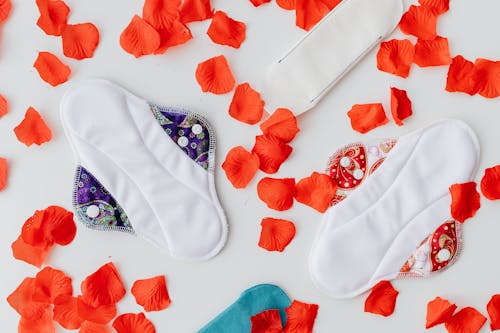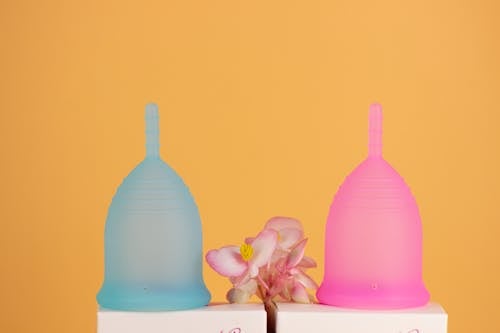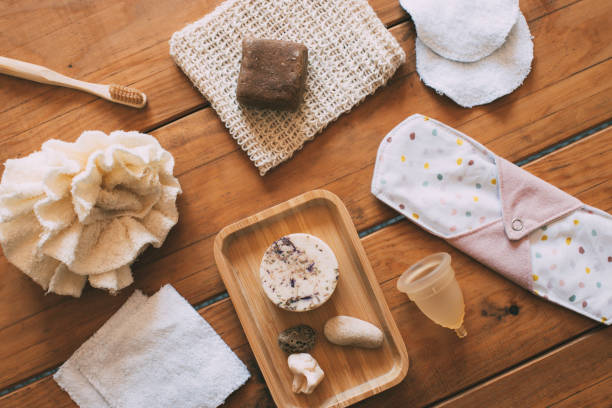5 Sustainable Period Products
5 Sustainable Period Products
The environmental impact of disposable period products is significant. In North America alone, around 20 billion sanitary napkins, tampons, and applicators end up in landfills each year. Considering that the average person who menstruates will have a menstrual cycle for about four decades and use approximately 9,000 to 10,000 tampons, the cumulative environmental consequences become apparent.
These conventional feminine hygiene products often contain a combination of cotton, plastic, perfumes, and other synthetic materials. When disposed of in landfills, they contribute to the production of methane, a potent greenhouse gas that contributes to climate change. Flushing tampons or other period products down the toilet is not a better solution either. It can lead to expensive blockages in sewage systems, resulting in sewage backflow and posing health hazards. Additionally, if these products make their way into oceans and other waterways, they create environmental hazards.
It's crucial to acknowledge the environmental impact of disposable period products and explore alternative options that are more sustainable and eco-friendly. By making conscious choices and adopting reusable and biodegradable alternatives, we can significantly reduce our ecological footprint and contribute to a healthier planet.
Thankfully, there are zero-waste period products available that not only help conserve resources but also offer potential cost savings. Let's delve into some of the most environmentally friendly options to help you make your period more sustainable.
Fortunately, there are several zero-waste period products available that can help you reduce waste and make your period more environmentally friendly. Let's explore some of the most sustainable options:
Period Underwear: These panties are designed to soak up period flow, preventing leaks and keeping your skin dry. They can be used as an additional layer of protection alongside a cup, disc, sponge, or tampon, or as a standalone option.
How to Clean Period Panties: Rinse the underwear in cold water immediately after use, then wash it in a washing machine or by hand using cold water and natural soap. Avoid using bleach or fabric softener. Line dry or dry on low heat in a dryer.
Recommended Brand: Beautikini Period Underwear offers leak-proof and comfortable products in various styles, and absorbency levels. They claim to absorb as much as three tampons.
Washable Cloth Pads and Pantyliners: Reusable cloth menstrual pads are an eco-friendly alternative to disposable pads. They come in cute patterns and offer comfort and durability. While they may cost more initially, they can save you money in the long run.
How to Clean Cloth Pads: Follow the same washing instructions as period underwear.
Menstrual Cups: These flexible funnel-shaped cups made of silicone or rubber are inserted into the vagina to catch menstrual flow. They are a long-lasting and cost-effective alternative to tampons.
How to Clean Menstrual Cups: Rinse the cup and apply mild soap after each use. Boil the cup in water for a few minutes at the end of each cycle.
Reusable Period Discs: Period discs are inserted into the vagina to collect menstrual blood. They can be worn during intercourse and offer a different fit than menstrual cups.
How to Clean Period Discs: Follow the same cleaning instructions as menstrual cups.
Menstrual Sponges: Sea sponges, when used as a period product, function similarly to tampons. They are reusable for up to six months and mold to the body for comfort.
How to Clean Menstrual Sponges: Rinse the sponge in water and use a gentle soap. Periodically, soak the sponge in a solution of warm water and vinegar, tea tree essential oil, hydrogen peroxide, or baking soda.
By choosing zero-waste period products, you can significantly reduce your environmental impact and make your period more sustainable.
Editor’s Picks
- $49.00 AUD
-
$0.00 AUD - $49.00 AUD
- Unit price
- / per
-
Black
-
Blue
-
Brown
-
Red
- Blue CuracaoTangerinePaisley Purple
- $49.00 AUD
-
$0.00 AUD - $49.00 AUD
- Unit price
- / per
-
Black
-
Dark Green
-
Moonlit Ocean
- $49.00 AUD
-
$0.00 AUD - $49.00 AUD
- Unit price
- / per
-
Black
-
Purple
-
Maroon
-
Dark Green
- $49.00 AUD
-
$0.00 AUD - $49.00 AUD
- Unit price
- / per
-
Black
-
Dark Blue
-
Bright Red
-
Grayish Brown
- Black LeafOrange RedBarrier ReefDark Green






















































































































Leave a comment
Please note, comments need to be approved before they are published.